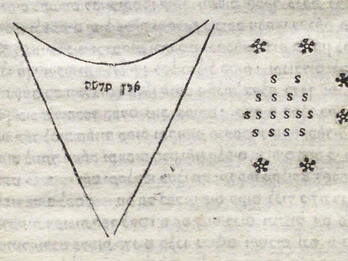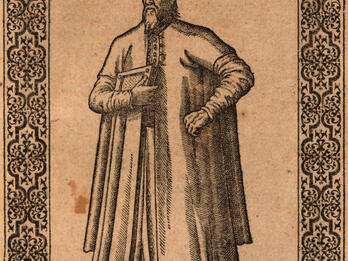Responsum: On Philosophy
On the twenty-fourth day of the counting [of the Omer] may there be tranquility and pleasantness in your chamber of Torah. The handmaids of the emperor’s house would sing his praises: “no eye-shadow and no rouge and yet he retains his natural beauty.”1 The sayings of the Lord are pure [see Psalms 12:7]—these are his sayings. Who can express his mighty acts and his praise [see Psalms 106:2]: the important rabbi, may his lamp shine, my relative, the teacher, the rabbi, Rabbi Moses, may his Rock protect him, and may his throne enjoy peace together with the entire company that encamps around his presence with their banners. May it be His will that his throne will be whole, without anyone frightening or scaring him.
I received your letter in a flying scroll,2 written on both sides [see Ezekiel 2:10]. I saw many sharp ideas in it, but I also felt the prick of a scalpel on my flesh. For I was coiled in ropes of wisdom, most of which were from external sources, in diverse vessels [see Esther 1:7], while the internal sources were left abandoned. Thus, the Torah dons sackcloth and laments with its young girls, for its sons and daughters are censured and indecent, like Adah and Zillah in the early generations [see Genesis 4:19–24]. As for the wisdom of Aristotle, to which you constantly turn, upon perusal of your writings I have seen smoke arising from your nostrils like a pyre, and out of anger you responded illogically. I said to myself, “come what may, I will conclude this peaceably, for there is no end to such bitter and sharp words in this current situation, unless we were to close our mouths like mutes.” Had you not written about me, “could a holy mouth have uttered such a thing etc.” [see b. Sanhedrin 23a], I would have remained silent. But I cannot do so now, and to let myself suffer from internal sorrow. I therefore decided to retort, and with great effort approach and say all that is in my heart:
In your first comments and claims about what I said, you wrote: I am Moses, the great scribe—where is your wisdom and where is your intelligence, etc. I am not greater than Solomon, etc. as eventually his arguments were correct; mine too, etc. Now, I am puzzled—is this a cause for complaint? I have shown you where there is room for debate and what answer you can give. I well know that there are various responses available. Have you never observed someone raising a difficulty—certainly this is possible for a man with a heart such as yours, as you have the heart of a lion and can demolish and rebuild. However, this was what appeared to me to be correct, when I quickly thought over it. You further wrote as follows: regarding that which his honor stated, “in any case it is not completely hard, like stone, for if so, it would be no worse than a sealed area in the lung, etc.,” it would seem from his honor’s comments that the only difference between a rocky growth and a sealed area is their level of hardness [see b. ḥullin 48b]. But it is amazing to me—could a holy mouth have uttered such a thing? For the opposite is the case [ . . . ] for a rocky growth does not have the same appearance as the lung, which means that it is like other growths, that can later heal. By contrast, the appearance of a sealed area has not changed, and yet it is hard, which means that it does not contain pus and is not a growth, for if it were so, it would be impossible for its appearance not to have changed. Consequently, the sealed area will not heal, and there is no reason why it would do so. This is well known from the science of medicine. Admittedly, in these matters we do not rely on such sources of wisdom, as stated by Maimonides ([Mishneh Torah,] Laws of Slaughter, ch. 6), but even so, whenever we can take matters that depend on nature and draw them closer to our sources, so that they do not stray even a hairsbreadth from the Talmud and the statements of the Geonim, we will do so. [ . . . ] My main complaint in our back-and-forth was regarding your statement that it is rock hard, without any moisture. This is not correct in actuality; sometimes, if it contained no moisture at all it would be an actual terefah,3 as this is no worse than a sealed area, as I have explained. But you acted as though you were unaware of my argument, as you wrote: “if my honorable master is going to expound common terms, etc. you have made the essential matter into a secondary issue etc.” You thereby relegated my claims to the farthest corner, as though my very own words were stated by a commoner. For my fundamental point addressed your claim and understanding that it is literally rock hard without any pus or moisture, and that is not the case.
You then showed me something from the wisdom of the uncircumcised Aristotle, out of the vapors of the earth, etc. I declared: woe is me for what my eyes have seen, in addition to what my ears have heard. For your main delight and fragrance is in the words of that impure one—shall they be in the mouths of the sages like a perfume for the holy Torah?! May the Merciful One preserve us from such a great transgression! I will not respond with all of what I think about this matter. I have already seen the comments of Rav Hay [Ga’on], and the statements of the Rosh in his responsa, and the words of R. Isaac ben Sheshet (section 45)—one of the Spanish scholars who wrote about these matters—regarding what caused them and what had come upon them [see Esther 9:26]. I swear by the Temple service that I know as much as you do about their wisdom, but I keep far away from them [see Psalms 55:8], for even regarding their beautiful observations the sages have stated in tractate Avodah Zarah (17a) that the phrase “keep far from the entrance of her house” [see Proverbs 5:8] refers to such subjects, and there is no more destructive heresy than their wisdom. But a mere flying scroll cannot contain my whole opinion on this; rather, it must be conveyed in a clear, affectionate manner, face-to-face.
Now, I personally have seen the prayer of Aristotle written down in the prayers and prayer books of the young men. This is the fault of a prince such as yourself, as you enable these matters by mingling his statements with the words of the living God. They are worthwhile material only for the bathroom and the like, since the soul has [no] desire for them at all. And with a thousand apologies, I will say that it would be a better use of your time to study grammar, as your writing is generally like a breached wall when it comes to speaking in the second and third person, feminine and masculine forms, and singular and plural. On several occasions you wrote “what my master ask,” and this is self-contradictory, as it is both in the singular and the plural. You likewise wrote “I was managed to answer,” “it spoke both on its own behalf and for others,” and many similar examples. The early sages wrote in their responsa that if one is uncertain regarding how a name should be written in a bill of divorce, whether it should be full or defective, or whether it ends with the letter alef or heh, he can fully rely on the earlier writings of the sages, even their letters of correspondence, as they took pains to write accurately. I can criticize you from this very source, as you wrote Meshullam with the letter vav, and yet in Scripture it is written defectively [without the vav], as evident from the statement in tractate Megillah (23a): why was he called Meshullam? Because he was perfect [shalem] in his deeds. And the name is written likewise in bills of divorce. I write this with great affection, as the words of the rabbi are like fins etched before me when I behold the terrible ice [see Ezekiel 1:22]; my desire is to you, and you will rule over me [see Genesis 3:16; 4:7]. [ . . . ]
To conclude, I accept upon myself from this day that your love should be etched onto my heart. I wish that on your side you will be esteemed half as much, as you have not yet ceased, and I will say no more about the matter. May much life and peace be added to you [see Proverbs 3:2]. From your relative, who loves you with his heart and soul, Solomon, son of our teacher, the rabbi, R. Yeḥiel Luria, of blessed memory, the important rabbi; also known as R. Isaac.4
Notes
[See b. Ketubot 17a.—Trans.]
[See Zechariah 5:1. Here the expression means “by a speedy delivery.”—Trans.]
[An animal with a condition that will cause it to die within twelve months. Such an animal may not be eaten.—Trans.]
[After his maternal grandfather, R. Isaac, who brought him up after his father passed away when he was young.—Trans.]
Credits
Published in: The Posen Library of Jewish Culture and Civilization, vol. 5.




